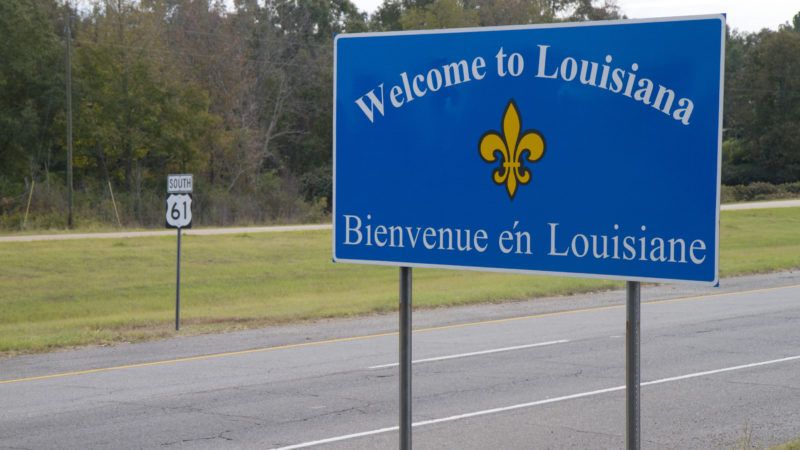New Louisiana Law Will Let Doctors Decide When Marijuana Is Right for Their Patients
While there are still numerous barriers to access in Louisiana's medical marijuana system, a specific list of "qualifying conditions" will no longer be one of them.

Louisiana Gov. John Bel Edwards (D) signed three laws last week that will expand access to the state's medical marijuana program, allow financial institutions to provide banking services to the medical cannabis industry, and protect from state prosecution doctors and health care facilities who treat medical marijuana patients. The laws go into effect on Aug. 1.
House Bill 418 (H.B. 418) says that "certain facilities and physicians shall be exempt from prosecution for certain violations of [Louisiana's] Uniform Controlled Dangerous Substances Law," and House Bill 211 (H.B. 211) says that the Louisiana Office of Financial Institutions cannot "prohibit or discourage" any financial institution from providing services to a "cannabis-related legitimate business or service provider solely because the account holder is a cannabis-related legitimate business, or is an employee, owner, or operator of a cannabis-related legitimate business."
Both of these laws should lead to an expansion of the state's nascent medical cannabis program—which Xander Peters wrote about for Reason last year—by incentivizing financial investment and participation by the medical community.
But the biggest reform might be House Bill 819's (H.B. 819) expansion of the state's list of "qualifying conditions." While the new law still includes a list of medical conditions for which a Louisiana physician may recommend cannabis, it adds a clause covering "any condition not otherwise specified…that a physician, in his medical opinion, considers debilitating to an individual patient and is qualified through his medical education and training to treat."
Augmenting a specific list of qualifying conditions with physician discretion is essentially adult recreational use with extra steps. As Peters noted in his story, state licensure of growers and retail facilities will continue to constrain supply, but with all licensed doctors "in good standing" with the state now empowered to recommend medical marijuana for any ailment they are qualified to treat, the number of Louisiana residents who are legally allowed to use cannabis could increase substantially.
Will allowing doctors to recommend cannabis for any ailment they see fit lead to some people who aren't actually sick gaining legal access? Probably. But "if you believe the government has no business drawing or policing this line, it is hard to get worked up about people who fake their way to a medical marijuana recommendation," Reason's Jacob Sullum wrote in an analysis of research published in 2011 showing that many California medical cannabis patients had been approved for conditions that were not nearly as debilitating or life-threatening as HIV/AIDS and cancer, the focus of the state's initial medical cannabis law. Sullum noted that doctors "commonly prescribe psychoactive pharmaceuticals to treat not only pain but also sleep disorders, anxiety, and depression—all with the government's blessing. If some people find that marijuana works better for these purposes, there is no rational reason to prevent them from using it."
National Organization for the Reform of Marijuana Laws (NORML) Deputy Director Paul Armentano released a statement applauding the new bills: "Just as doctors are entrusted to make decisions with regard to the supervised use of opioids and other medicines—many of which pose far greater risks to patients than cannabis—the law should provide doctors with similar flexibility when it comes to recommending cannabis therapy to a bona fide patient."
If there is any reason to doubt that the new authority granted to physicians will lead to an increase in registered medical marijuana patients, it's the requirement that physicians enter patient data in Louisiana's prescription monitoring program.
These registries are used to track and prosecute patients who seek concurrent prescriptions for the same drug from different prescribers and to investigate doctors who appear to be dispensing drugs for "nonmedical" reasons. Drug enforcers love these databases and civil libertarians despise them. Louisiana doctors who want to recommend medical marijuana to their patients will need to be cognizant of the reporting requirements and H.B. 819's insistence that medical cannabis is recommended only in the context of "a bona fide doctor-patient relationship," language meant to prevent doctors from running the cannabis equivalent of "pill mills."
In other cannabis news from the Pelican State: Tom Angell of Marijuana Majority reports that Louisiana has allowed home delivery of medical cannabis during COVID-19, and that H.B. 819 sponsor Rep. Larry Bagley, a Republican, believes his bill will allow it to continue after the pandemic.


Show Comments (4)